Mount Yasur

|
Mount
Yasur
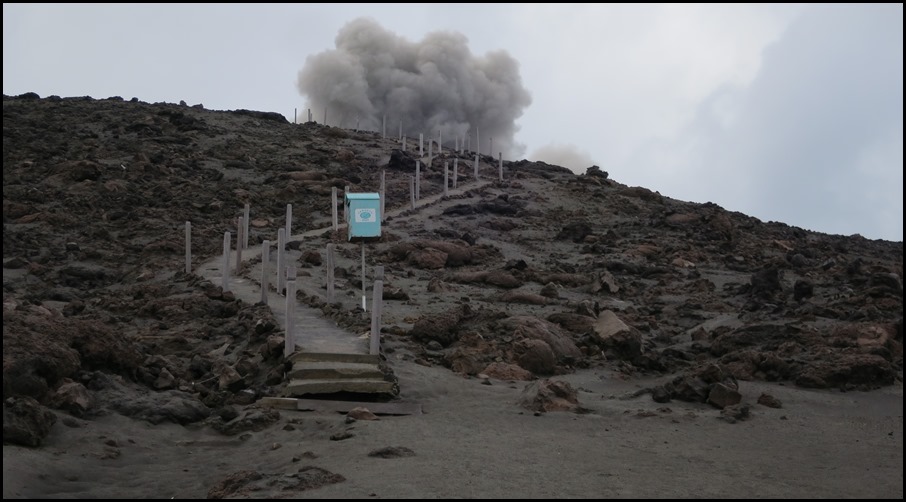 No sooner than Sam had pulled on the
handbrake than Mount Yasur said ‘hello’.
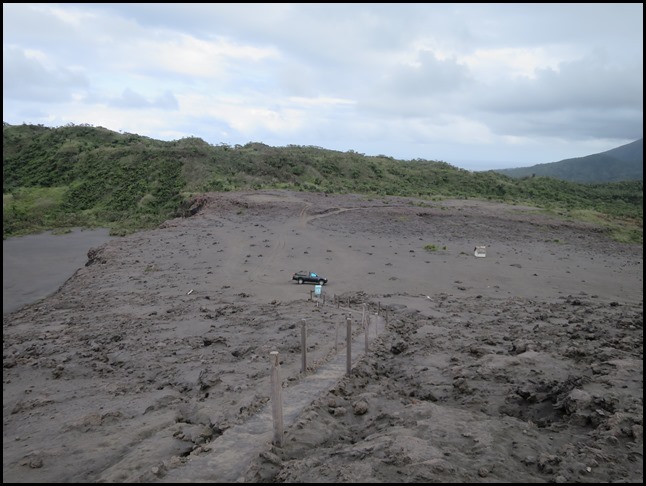 From the top of the path we looked
back over the cinder valley and Sam’s truck – all
alone, for now. Every day tourists come to see perhaps one of the world’s most
accessible volcanoes. Some fly over, some fly in and stay overnight at a resort
up the west coast having a bumpy three hour trip here. From Lenakel they have an
hour of bumps. Another rumble and we follow Sam to the right.
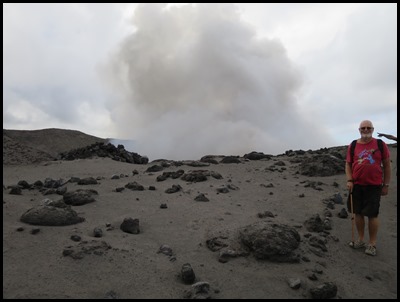 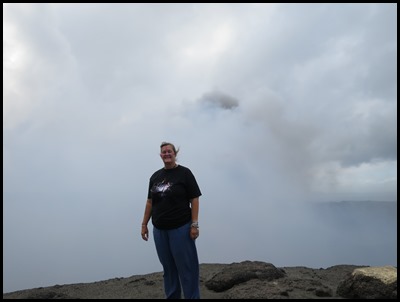 Most come, like Bear to see the volcano spitting red as night falls, I’m here to feel the earth shudder and hear the immense
noise.
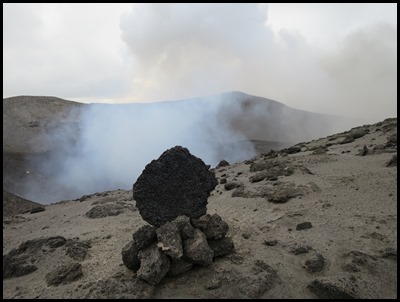 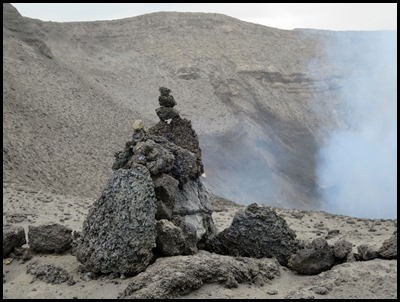 We walk by stone
sculptures. Easy to build with the light, jagged volcanic
material.
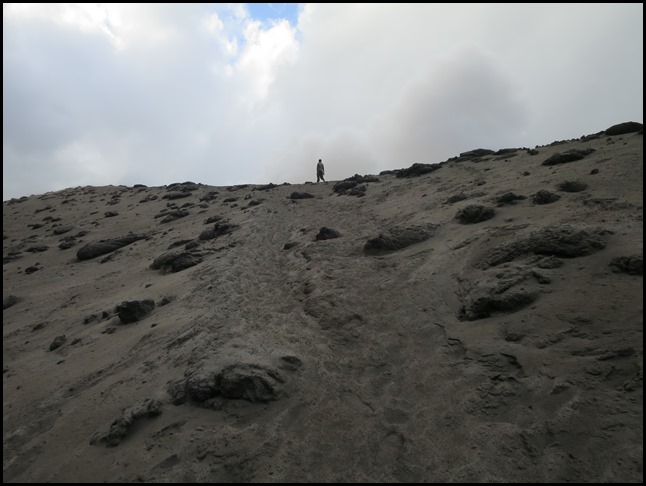 We set off after
Sam who takes us up to “the best view”.
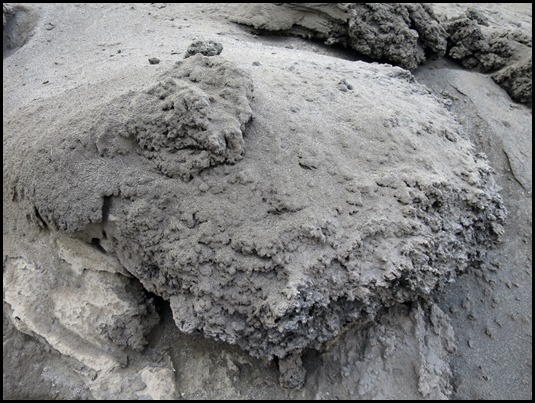 Along the top path Sam points to
a big boulder, three feet
across. “That wasn’t there a few days ago”. It’s time he gives us a
safety briefing. “If you see a big rock coming toward you, stand still and
watch, turn sideways and as it falls step back”. Rightee-oo then, never mind the
fact that the inbound missile is several million degrees Centigrade........
Mmmm. Mmmm indeed.
Mount Yasur stands 1,184 feet or 361 metres above sea level, on the coast near Sulphur Bay, southeast of the taller Mount Tukosmera, which was active in the Pleistocene. It has a largely unvegetated pyroclastic cone with a nearly circular summit crater 400 metres in diameter. It is a stratovolcano, caused by the eastward-moving Indo-Australian Plate being subducted under the westward-moving Pacific Plate. It has been erupting nearly continuously for over 800 years, although it can usually be approached safely. Its eruptions, which often occur several times an hour, are classified as Strombolian or Vulcanian. The glow of the volcano was apparently what attracted Captain James Cook on the first European journey to the island in 1774. Today the mountain is a sacred area for the John Frum cargo cult. A visiting television team found in a deep gully left by a lake which had suddenly drained, an exposure of old ash deposits including thick layers telling of two massive eruptions "more powerful than Mount St. Helens" several centuries or more ago; one of them had made the old caldera that Mount Yasur is inside. In Volcano speak: Yasur is largely contained within the small Yenkahe caldera and is the youngest of a group of Holocene volcanic centres constructed over the down-dropped north east flank of the Pleistocene Tukosmeru volcano. The Yenkahe horst is located within the Siwi ring fracture, a 4-km-wide, horseshoe-shaped caldera associated with eruption of the andesitic Siwi pyroclastic sequence. Active tectonism along the Yenkahe horst accompanying eruptions of Yasur has raised Port Resolution harbour more than 20 metres during the past century. Well that answers how HMS Resolution got in. Yasur volcano has the second greatest level of ground uplift in the world. Since 1000 AD there has been a yearly average uplift of 149 mm. This is only beaten by Iwo Jima volcano in Japan with 200 mm uplift per year since 1200 AD. 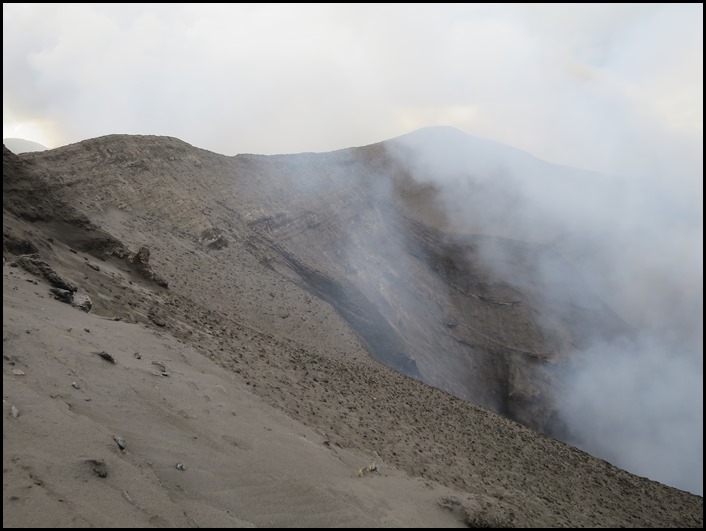 What a view
at the top.
Mount Yasur is an easily accessible active volcano, and is a major Vanuatu tourist attraction. The Vanuatu Government monitors the level of volcanic activity in the interests of the public, both tourists and locals alike. This monitoring is carried out by the Vanuatu Geo-Hazards Observatory. The importance of the volcano to Tanna's tourism industry has resulted in the local government creating levels to restrict people's access. These levels range from 0-4 as follows: · Level 0 - Low activity, access to the crater allowed · Level 1 - Normal activity, access to the crater allowed – Fortunately today’s level. · Level 2 - Moderate to high activity, lava bombs may land beyond the crater rim, access to the crater is closed · Level 3 - Severe activity with loud explosions, lava bombs ejected up to hundreds of metres outside the crater and large plumes of smoke and ash, access to the summit zone is closed · Level 4 - Major eruption affecting large areas around the volcano and possibly other parts of Tanna and even neighbouring islands, all access closed. 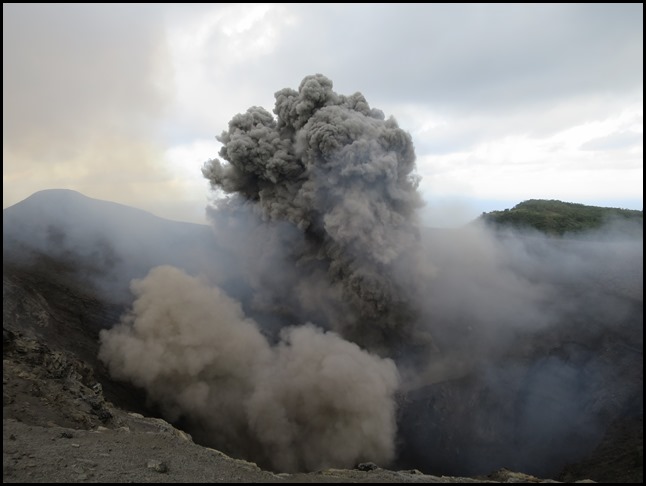 I sat on the ground to get my ‘feel’
and wasn’t disappointed when, after an hour we had our
biggest grumble, to say the earth shook would be an understatement. Dark
smoke came from the rear crater, mid grey from the left and white from the
front. Mount Yasur is steeped in legend: Once upon a time, the volcano-man
Yasur found refuge with two old ladies; he liked it there and decided to stay
forever, swallowing up the house and its occupants and that was where the three
craters stem from, one for each of Yasur’s victims, each named after the local
languages. But most local people believe that Yasur is the House of
Spirits. It was smashing to have Sam to ourselves. We asked all sorts of
questions and in return Sam taught us much about Tanna. Sitting and studying, we
had learned to watch for the white smoke to clear and we could see a rib down on
the left, ‘he’ was ready to blow. Every three to five minutes we heard a ‘swish
sweeeesh’, that was no use, we had to wait for calm and quiet and
then............a cannon exploded.
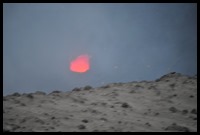 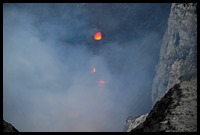 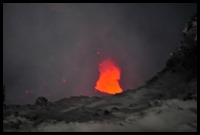 Still on our own Sam said he would
take us for a treat. Knowing us to be ‘game ol’ birds’, he led us up a really
skinny track way up behind the crater. Wow, we had now walked through one
hundred and eighty degrees. We looked down into the lava
itself. Then the wind really picked up and we got a good lungful of hot,
dusty air. Time for me to go back to my perch methinks, from up here we could
see a couple of trucks coming up the track, twinkle-toes turn on the narrow path
and back to our original place before others arrive.
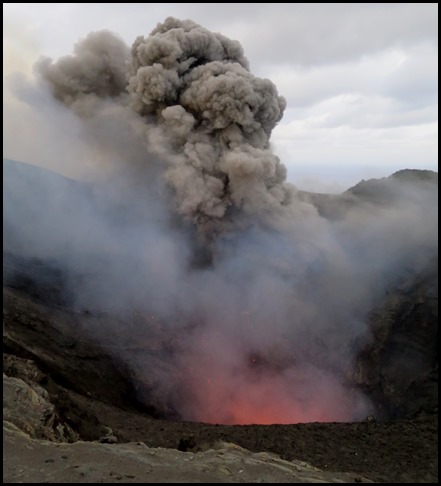 Six people appeared over the rim
behind us. As one particular crack sounded a lady ducked and cradled her head. I
asked Sam if anyone refused to come up to the top. “Once I brought six people, a
lady heard a rumble and got straight back in the truck. The other five made it
to the top of the first track, he blew quite a big one and theytoo ran back to
the truck.” Dusk was approaching and as soon as the light faded a little we
began to see a red glow.
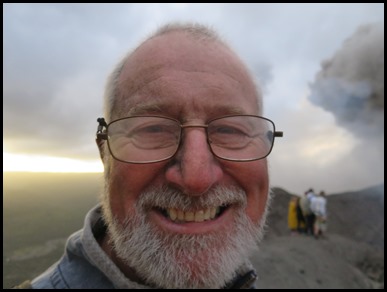 Dirty Bear. The wind was now constant and it was getting cold. Each new gust
gave us a thorough sand blasting, black dust got everywhere and soon we looked
like chimney sweeps – not that our enthusiasm was dented by a ha’puth.
Sunset was a last on the way.
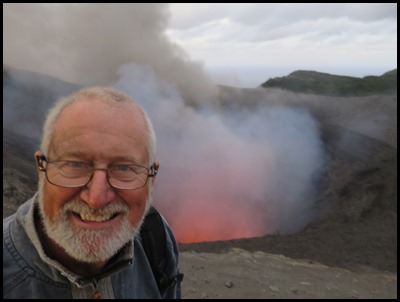 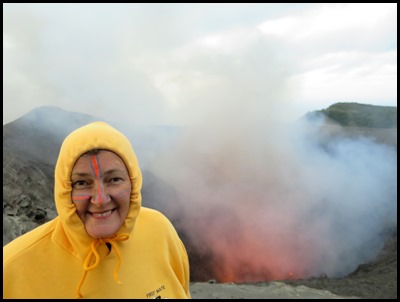 Of course we did.
With that as a backdrop ???? Cheesy grins were there
permanently.
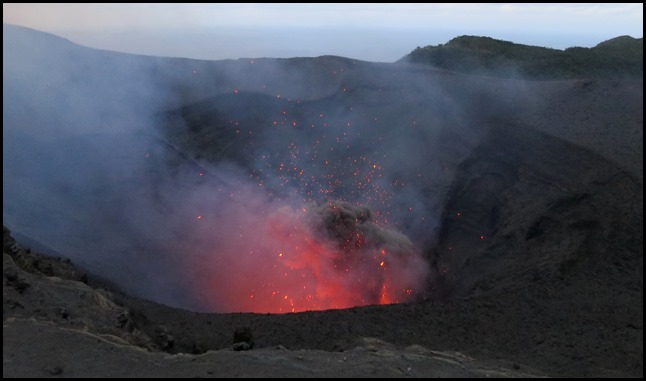 The noise was
incredible. Imagine a subway car racing through a tunnel and multiply that whish
of air. Then imaging an enormous wave hitting the back of a cave. As boulders
hit the side of the crater walls we heard a dull thud but if they fell into lava
we could just make out a ‘plop’. A big rumble we
could feel in our chest and the ground shook enough to make it difficult to hold
the camera perfectly still. Big rumbles didn’t necessary mean big plumes of
smoke or lava spits, some made very impressive noises. You can only visit Mount
Yasur if he is registering Level One or Two – above that he is too
unpredictable. He is monitored mechanically from Port Vila. One story we really
did love was when Sam told us the people who live in a village below the
mountain ask when they need a light. They look up and simply ask Yasur himself.
Within a few minutes a glowing rock will throw itself into the air and land just
beside the person who asked...........
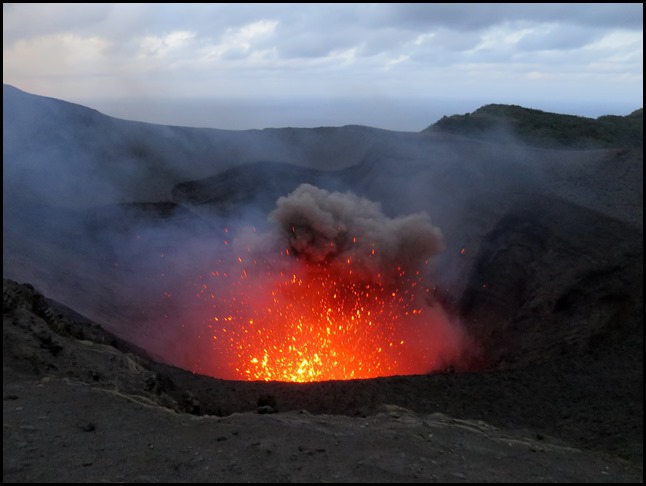 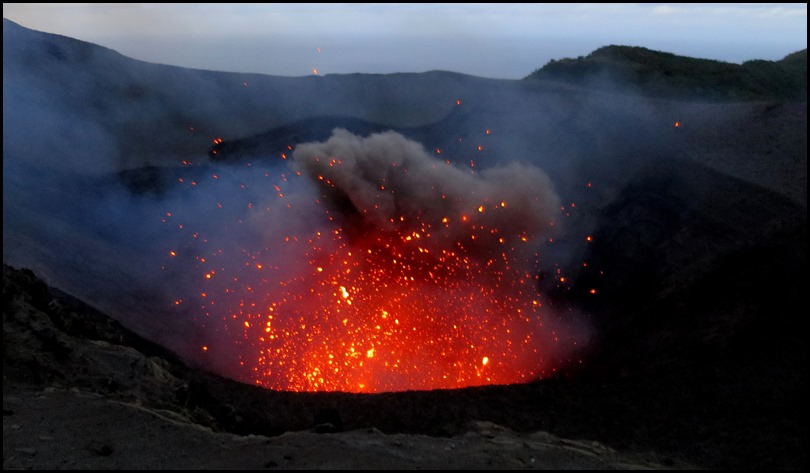 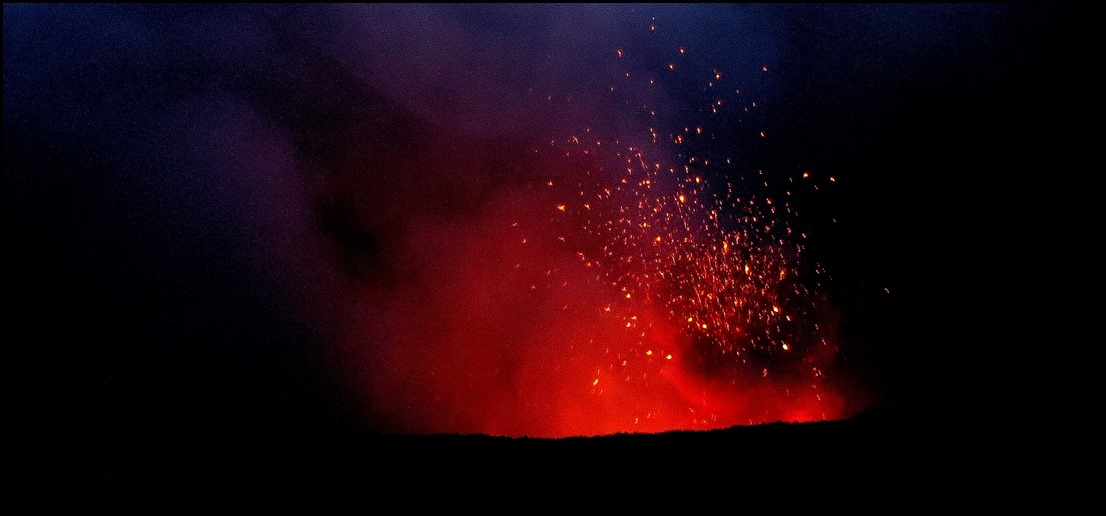 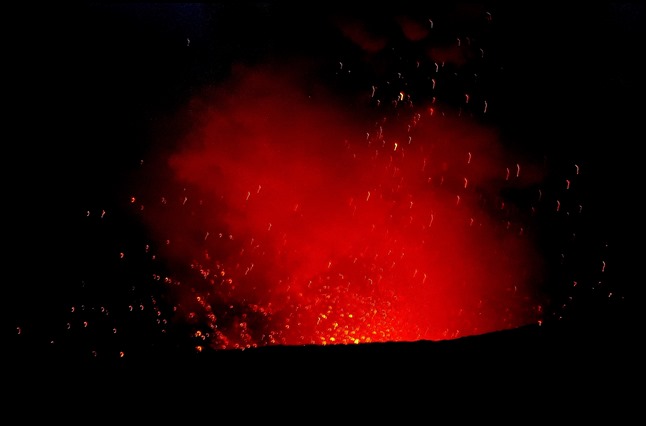 ALL IN ALL MOTHER NATURE AT
HER BEST
THE MOST AMAZING
SPECTACLE |